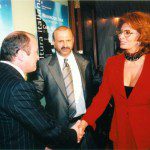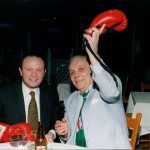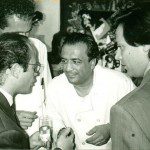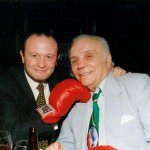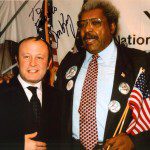Franco Nuschese and Cafe Milano: A Singular Philosophy
By • May 3, 2012 0 3997
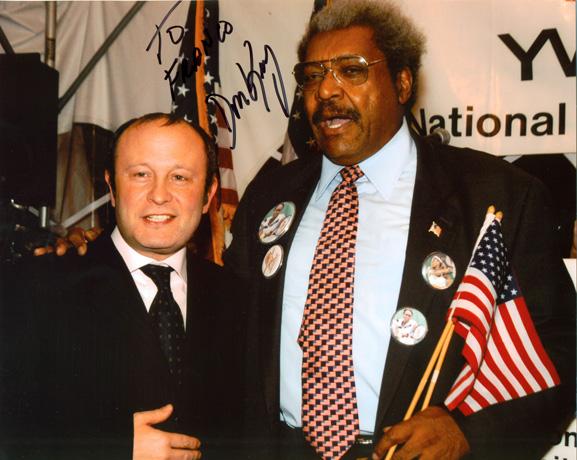
Franco Nuschese, 50, custom suit, designer glasses, warm smile. He sits at his desk in his office above Cafe Milano in Georgetown reviewing finances and chatting with his publicist, Jan. He is calm, approachable and chooses tea instead of coffee. It is a serene morning for Nuschese—a time with no fires to put out, a moment of contemplation, a chance to speak openly about his life’s accomplishments and epiphanies.
Cafe Milano, a longtime Washington D.C. landmark known for its Italian hospitality and discretion, still maintains the same air of exclusivity since its opening on Nov. 3, 1992.
Nuschese has devoted the last 19 years to curating a trustworthy team dedicated to upholding the restaurant’s unique fine dining identity in combination with its reputation for celebrity accommodation. A conversation with Nuschese quickly unveils that Cafe Milano is a direct reflection of the man himself — his charm, his welcoming personality and his incredible ability to put people at ease.
But with the recent passing of his father, Giuseppe, and longtime mentor Terry Lanni, Nuschese now approaches a new phase in life: one that involves facing forward without the guidance of those lost. For him, riding on the coattails of the past is not an option. Nuschese speaks enthusiastically of expansion in association with his current company, The Georgetown Entertainment Group, as well as his recent passion in the production and distribution of Italian wine. It is clear he envisions the future with the same child-like energy as the day Cafe Milano opened its doors to the movers and shakers of Washington.
The Georgetowner sat down with Nuschese on a calm winter morning to hear the story of his restaurant, his thoughts on community giving, his opinions on Italian politics and what it takes to create a successful, timeless restaurant.
With Washington’s ever-changing culinary world more active than ever before, Nuschese shared his philosophy on success and discussed how he managed to create an epicurean empire still reigning amid the hills of Georgetown.
The Georgetowner: Through all these years, what has been your secret to maintaining such a high-profile clientele at Cafe Milano?
Franco Nuschese: Mine are a very demanding type of clientele. At all costs, it is my responsibility to ensure they leave happy. Period. My experience of working in Las Vegas, and under those principles, has helped me understand this. I aim to please and, of course, I brought to Washington a familiar idea: “Whatever happens in Vegas …” You know the rest.
GT: Cafe Milano has a flawless reputation, and has survived on top through numerous presidential administrations and Washington’s continually expanding culinary scene. You created a timeless restaurant. How were you able to do that?
FN: It’s simple, believe it or not. You have to give to the people what they want. It’s all about consistency. It is one of the biggest challenges to a restaurant. It’s great to open your doors as a new restaurant owner and feed off the excitement and positive energy of that time, but really it is getting to know your clientele personally. You exist for them. Through promotions and special invitations, it’s easy to get them in once, but the hardest part is to get them to come back on their own.
GT: What must you do in order to get the people to come back?
FN: Consistency. As a restaurant owner, you must spend time up front in designing the right staff to help you with this. In a changing city like Washington, it is about creating that stability. Your staff must be as dedicated as you are to the concept.
GT: Once you are confident with your staff, what else is crucial to giving the people what they want?
FN: A restaurant must have a great vibe. It is my responsibility to foster that atmosphere. People need to feel the vibe bounce from their skin when they walk in. It’s in the simple things: the light in the candles, the bar, the music, the food. The clientele may not be able to put their finger on what it is, but you know because you created it. People come to a restaurant because they want to see and they want to be seen, all the while wanting the privacy they deserve.
When you open a restaurant — or any business for that matter — it is like you are opening your home. You are, in a way, selling yourself. These are your guests, and you have to be a host. You have to make them feel like they’re at home. It is under your roof that your guest wants to bring their best friends, their girlfriends, their colleagues or whatever. In order to be successful, your business needs to be versatile in this way.”
GT: Tell us about opening night at CafeMilano.
FN: (Smiling.) It was a very cold night in November in ‘92. I’ll tell you, it was great. The bar was packed. I must say, in a very humble way of course, I immediately knew what was going to happen.
GT: So, you felt immediately that Cafe Milano would be a success?
FN: I knew it was going to be alright because it is very easy for me to absorb the energy of the people. This is a very important tool for a business owner. One must humble themselves and really value their client and get to the core of their likes and dislikes. That night I saw lobbyists and politicians really enjoying themselves. These people work all day in very conservative and calculated atmospheres. That night, I saw them relax in the atmosphere I created for them. At the time, we only had 52 seats and I knew immediately we would need to expand.
GT: You appeared on the Italian reality show, “Dreaming of Italy,” designed to highlight Italian-Americans who found success in the U.S. So…do you dream of Italy?
FN: I can tell you one thing. I might live in the U.S., but I live like an Italian. From the minute I wake up to the minute I go to sleep.
GT: What does that mean, to wake up in the morning as an Italian in Washington?
FN: I wake up, I have a decaf espresso, I read the Italian paper and watch the Italian news. I also live my life like there’s no tomorrow. As one should.
GT: What are your thoughts on the current state of Italian politics?
FN: I think [former Italian Prime Minister] Silvio Berlusconi was extremely good for Italy. He has been around for 60 years. But, like everything else, times have changed. We cannot afford to do the same things we used to. He has been a great leader and a great entrepreneur, but we needed to turn the page. When it comes to politics and the media, it’s a totally different world now. Facebook and Twitter have changed everything. You cannot get away with anything anymore. Anything you say, anytime, anywhere within seconds becomes public.
GT: So, what will happen to Italy now?
FN: All I know is that if Italy fails, the U.S. fails. There has never been more attention on Italy than there is today. The economy is too big and produces too much. Someone will step in.
GT: You were born in Minori, a tiny town on the Amalfi Coast in Italy. You’ve worked in London and Las Vegas. But you built your empire here in the District. Why Washington?
FN: Well, it’s the center of the universe. Think world politics, business, everything is going through here. And besides, geographically you are close to everything: New York City, Europe, even the Bahamas!
GT: In the past decade, you have received numerous awards for your community partnerships here in Washington. How do you define the importance of community in your business?
FN: I come from a small city where most people do not have the luxury of entrepreneurship. But one thing I did learn, is when you make money you must invest it back into the community. It’s an amazing feeling to be able to do that. A luxury even.
GT: When you look back upon your personal achievements, how do you feel?
FN: (Laughing) Actually, I’m having more fun now than 30 years ago. As an entrepreneur, I was always anxious with the pressure of creating and protecting my business. People will tell you that nothing lasts forever. I never stopped to worry about it, though. Now I don’t even feel like I’m 50. I’m still having such a great time.
- Jordan Wright
- Jordan Wright
- Jordan Wright
- Franco Nuschese pictured with Don King. | Jordan Wright






